National Association of Retail Grocers of Australia
(NARGA)
INDEX
Home * Contact * Current Issues * Priority Issues * WebSite Index * Your Comments
RETAIL GROCERY MARKET SHARE CAMPAIGN
The National Association of Retail Grocers of Australia (NARGA), is seeking your support for Australia’s small independent grocers and grocery sectors, to ensure competition is retained in the retail grocery market.
This is because the two major supermarket chains’ now control over 80 per cent of the market – a stranglehold almost unprecedented in the western world – and getting worse! If nothing is done, by the year 2010 the big chains will control 85% or more of the market, with independents facing the prospect of being little more than skeletons in the sand.
Our 'Enough is Enough Market Share Campaign' has been launched in every State of Australia.
This campaign is sponsored by the National Association of Retail Grocers of Australia (NARGA), and is receiving strong support from other supporting small business organisations. We are hoping that following consideration of this article, you may also support this campaign. NARGA itself represents 10,000 small and independent retailers throughout Australia in an industry sector of more than 65,000 stores employing 250,000 Australians.
The major chains’ stranglehold on the retail grocery market is unhealthy, anti-competitive, and contrary to the public interest. The chains’ market dominance is destroying jobs, families, small business and regional communities.
The growth of the major chains, Coles and Woolworths, is killing off independent grocery stores. Without real competition, consumers will pay more for their groceries. The big two chains take 80¢ in every $1 spent on groceries. Your local family store is being forced out of business, and jobs are being lost.
As you would know, independent stores are the lifeblood of rural and regional Australia and of local communities. In 1975 the big chains had only a 40% market share. Now they have 80% and much of this by chequebook acquisition. In fact, their market dominance is almost unprecedented in the western world.
In the United Kingdom, the three largest grocery chains have less than 45% of the market, in the USA less than 21%, and in Japan 17.5%. The chains are not allowed to dominate. Australia has laws combating the media barons and a ‘four pillars’ banking policy (to limit concentration in the banking sector) but the big chains are allowed open slather in our retail market.
The chains’ domination has a very serious and adverse impact across a range of business sectors and geographical regions. The small businesses specifically affected include butchers, bakers, pharmacists, florists, newsagents, petrol station operators and liquor outlets. They have similarly been hurt by the chains’ insatiable appetite for market share.
All we seek is a fair go for small business. Our aim is to ensure the Federal Government caps the chains’ market share at 80%, and then to ensure a winding-back by a more rigorous enforcement of the Trade Practices Act, or if necessary, forced divestiture by legislative means. The present National Competition Policy, which is assisting the chains’ market share grab, is an example of economic rationalism gone mad.
Return to: INDEX
Home * Contact * Current Issues * Priority Issues * WebSite Index * Your Comments
Queensland's Grocers - Most Affected
SMALL and independent retailers are banding together to fight back against the increasing dominance of the big three supermarket chains in Australia.
The National Association of Retail Grocers of Australia (NARGA) 'Fightback for Survival' campaign was launched on the Gold Coast, firing the first salvos in the David and Goliath battle, which will be waged in the lead up to the Federal election. The small and independent retailers say they are determined to win and will target marginal, rural and regional seats.
NARGA national spokesman Alan McKenzie said large supermarket chains have been increasingly dominating the Australian landscape since the 1970s and it has now become dangerously unhealthy.
"In 1975 the big supermarket chains had 40 per cent of the retail grocery market," he said.
"Today that has doubled to 80 per cent, and if we don’t stop the rot now, by the year 2005, the big chains will have a stranglehold on 85 per cent of the market and the independent retailers face the prospect of being reduced to little more than skeletons in the sand."
NARGA directly represents 10,000 small and independent retailers throughout Australia in an industry sector of more than 65,000 stores employing an estimated 250,000 Australians.
Mr McKenzie said the market dominance of Australia’s major chains is almost unprecedented in the western world, is anti-competitive, and against the public interest.
"The big chains are assisted in their drive for total market dominance by weak and misguided governments." he said.
"In the USA the top three chains have a holding of 21 per cent and in the UK no more than 45 per cent."
Queensland Retail Traders and Shopkeepers Association executive director Ian Baldock said Queensland has the highest level of concentration of any state with the big two holding a dominating 86 per cent.
He said the stranglehold by the big chains on the retail grocery market in Australia is bad news for...
| Jobs |
|
| Small Business |
|
| Rural and Regional
Communities |
|
| Families |
"Every one new job in a major chain means 1.7 fewer jobs in the small independent retail sector." he said.
"The dogged incursion of the big chains in rural and regional communities erodes their very infrastructure and foundation."
"The loss of small and independent stores, together with the loss of banks and other infrastructure could mean the complete shutdown of facilities in those communities."
Mr McKenzie said the campaign will be run in each state in Australia with extensive grassroots participation by individual storeowners co-ordinated at local, regional and state levels.
"All we seek is a fair go for small businesses throughout Australia,’’ he said. Our aim is to ensure the Federal Government caps the chains’ market share and then to ensure a winding back by a more rigorous enforcement of the Trade Practices Act, or if necessary forced divestiture by legislative means."
"The present competition policy is an example of economic rationalism gone mad. Trade practices legislation needs to be tightened up to allow small businesses to compete on a level playing field against the big supermarket chains."
Return to: INDEX
Home * Contact * Current Issues * Priority Issues * WebSite Index * Your Comments
Market Share Retail Grocery Sector
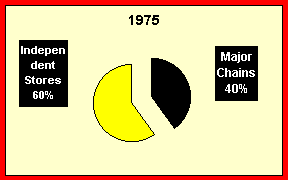
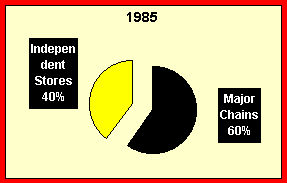

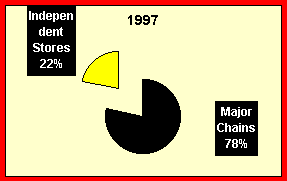
Home * Contact * Current Issues * Priority Issues * WebSite Index * Your Comments
The two major chains control over 80% of the retail grocery market in Australia, with the independents just under 20%. If nothing is done to stem the growing stranglehold of the major chains, by the year 2010 the chains will hold 85% and with the independents at 15% they will be facing the prospect of being little more than skeletons in the sand.
The market dominance of the major chains is almost unprecedented in the western world, is anti-competitive and against the public interest. In the United Kingdom the three largest chains have less than 45% of the market, in the USA the big three chains have less than 21% and in Japan 17.5%.
The big chains are assisted in their drive for total market control by weak and/or misinformed governments. We have laws combating the media barons and Government has a ‘four pillars’ banking policy to stop the major banks totally dominating, but the big chains are allowed open slather in our retail markets.
If the major chains get total dominance and control, it will lead to the destruction of small business. This stranglehold on the retail grocery market in Australia is:
 | Anti Jobs: |
 |
Employment - according to recent
COSBOA advice, every one new job in a major chain is 1.7 less jobs in a smaller retailer; |
 |
Anti Small
Business: |
 |
Small Business - reducing market
share of independent grocers means less jobs in small business, the silent engine of our
economy. Don’t forget the major chains’ insatiable appetite for market share is
now adversely affecting butchers, bakers, florists, pharmacists, petrol station operators,
newsagents and also banking services, and liquor outlets. |
 |
Anti Rural and Regional Communities: |
Rural and Regional Communities - the dogged incursion of the big chains (in pursuit of increased market share) in these areas erodes their very infrastructure and foundation.
 |
Anti Families: |
Families - most small business grocers are family owned and operated. Remember their profits are reinvested locally not redirected elsewhere or overseas. The vast majority are Australian owned and operated.
 |
Anti Competitive Environment: |
Prices - in Australia, with such market dominance by the two major chains we have an unhealthy and anti-competitive environment, arguably the most restrictive in the world. The end result is, if the local independents are unable to compete, the oligarchy effectively, by implied collusion, have the power to raise prices to the benefit of their shareholders but to the detriment of local Australian consumers. Such an environment is contrary to Australia’s public interest, yet the ACCC and the NCC under the existing provisions of the Trade Practices Act appear powerless to stay this trend without the creation of effective Anti-Trust legislation similar to that in place in the USA.
The independent grocery sector has no option but to strike back.
Enough is Enough!
WE NEED TO ACT NOW BEFORE IT’S TOO LATE!
Return to: INDEX
Home * Contact * Current Issues * Priority Issues * WebSite Index * Your Comments
|
To stem the growing stranglehold of the major chains on the retail grocery market in Australia, and |
|
| To ensure a winding back of the chains’ market dominance by the more rigorous enforcement of the Trade Practices Act 1974 and if necessary forced divestiture by legislative means (as done in the USA). |
Return to: INDEX
Home * Contact * Current Issues * Priority Issues * WebSite Index * Your Comments
| To immediately place a
cap of 80% of the retail grocery market on the three major chains, which is their
current market share. |
|
| The 80% capping be
reduced to 75% within five (5) years with each major chain being allowed to control no
more than 25% of the total retail grocery market share. |
|
| That a comprehensive
socio-economic impact study be undertaken immediately to consider the impact of the growth
in dominance of the major chains on Australian small business, jobs, families, regional
areas and the community in general (similar to the Shils Report USA, July 1997). |
|
| To request State,
Territory and local governments to require an economic and social impact statement be
prepared for all new shopping centres or significant retail developments proposed by the
major retail chains. |
|
| To support a moratorium
on the extension of shop trading hours in every State/Territory pending the outcome of the
Study in Recommendation 3. |
|
| In implementing National
Competition Policy and considering what is in the public interest, it is important a more
balanced impact assessment is made before any further regulatory changes are made and a
greater emphasis given to local, social and community impacts. |
|
| To immediately appoint
at least two small/micro-business representatives to the National Competition Council with
one acting as co-Chairperson. |
|
|
Support for the appointment of a further small/micro-business representative to the Australian Competition and Consumer Commission and small/micro-business representatives be appointed to other government or semi-government agencies as appropriate as soon as possible. |
Return to: INDEX
Home * Contact * Current Issues * Priority Issues * WebSite Index * Your Comments
COMPARISONS
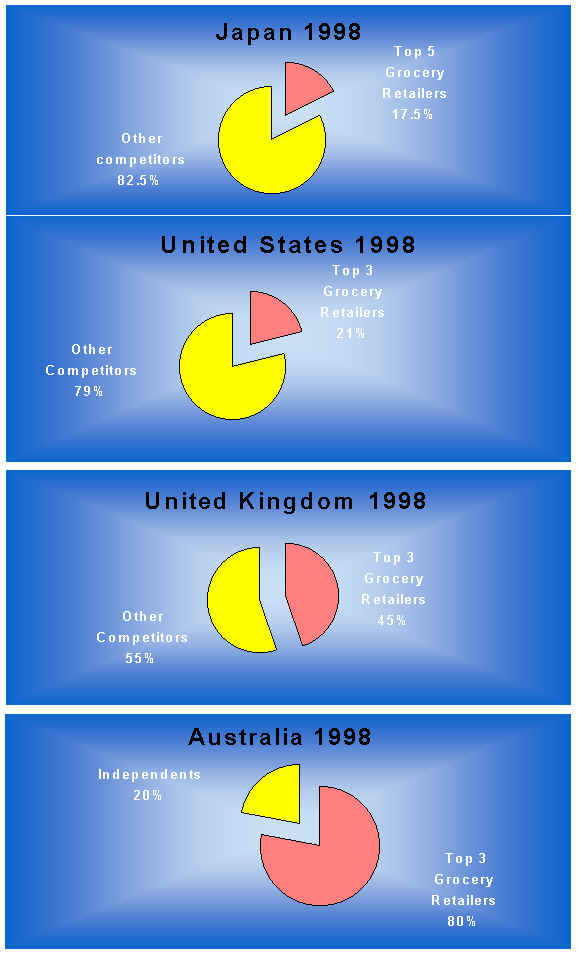
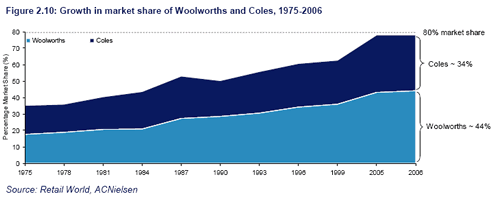
For more information contact...
NARGA Secretariat
Ken Henrick (Chief Executive Officer)
Suite 9, Level 2, 33 MacMahon Street
Hurstville NSW 2220
Telephone: 02 9585
0721 - 02 9586 4671 - 02 9580 1602
Return to: INDEX
![]()
This Site is part of the WebSite
SELWYN JOHNSTON
